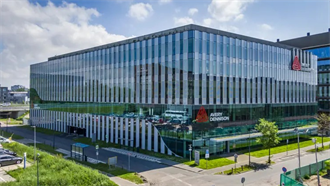A new pan-European real estate firm from industry veterans Arvi Luoma and Gordon DuGan is readying €1 bn of capital to target ‘business critical’ real estate assets across the region – despite a black swan interruption.
Launched on 3 March, Blackbrook focuses on single-tenant commercial real estate properties in a range of asset classes, backed by more than €1 bn in capital commitments from Connecticut-based Eldridge Industries.
Arvi Luoma, formerly of WP Carey, and Gordon DuGan, formerly of Gramercy Property Trust, have taken on the role of CEO and chairman respectively.
With a mandate to invest largely in strategic industrial assets, including logistics, light manufacturing, cold storage and similar properties used in the distribution and delivery of goods throughout Europe, the business case for Blackbrook has perhaps never been stronger – although its timing is not without drawbacks, Luoma admitted.
‘We kicked off at the start of March and were ready to meet people at Mipim,’ he said. ‘The timing was somewhat unfortunate – launching a business just before the world comes to a halt.’
‘But we have already put a team together, attracted significant capital, and are monitoring the market for deals,’ DuGan added. ‘It would be worse if we were already working with a portfolio that was exposed to more vulnerable sectors.’
Crisis ready
Headquartered in London, Blackbrook acquires single-tenant net leased assets and offers build-to-suit financing and sale-and-leaseback solutions. In this, it expects to be more relevant than ever.
‘At a time like this, when companies start to find the markets challenging, using sale-and-leasebacks as an alternative source of capital is actually very interesting,’ Luoma said. ‘We also think we are well positioned as a new business, having a substantial funding capacity.’
The firm also plans to invest in healthcare, hospitality, strategic office and specialty retail assets, although ‘the focus is on industrial in a broad sense – which will make up probably about three-quarters of the portfolio,’ Luoma confirmed.
And it’s in the ‘business critical’ dimension of Blackbrook’s mandate where things get interesting – particularly looped into the current crisis.
‘We see the current crisis accelerating a number of trends that were in the property world globally,’ DuGan noted. ‘Eventually this is to the benefit of industrial real estate, as people see that supply chains need to have a bit more redundancy in them and require a little more space for stock.’
‘It has long been noted that Europe has a shortage of last mile and logistics assets,’ Luoma added. ‘E-commerce on the continent has lagged the UK in terms of deliveries. The current climate is likely to push forward logistics development, along with more businesses using the hub and spoke strategy of warehousing and distribution.
'Another aspect is the speed of delivery – if everyone is at home, people demand things more quickly, and this becomes self-perpetuating as it becomes the accepted norm.’
A further benefit to the business model will undoubtedly be the lessons learned from previous downturns.
‘We were both investing in real estate through the global financial crisis, which obviously had a severe impact globally, but even there, we learned how to navigate the markets,’ Luoma said.
‘A strategy of really keeping our eyes and ears open, having dry powder, being selective, helping companies that needed liquidity via sale-and-leasebacks, keeping ourselves in a position where we were constantly monitoring the market, and being able to deploy quickly – that all helped. And I’m sure that it will help again,’ Luoma concluded.


































